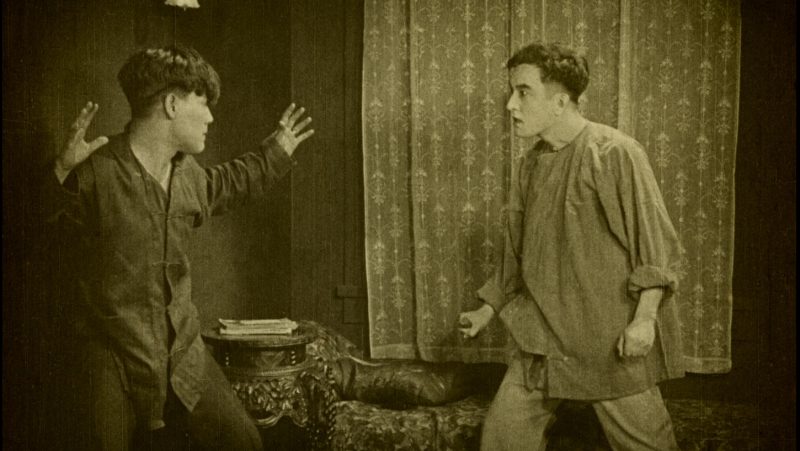A film from the National Film Archive of Japan in Tokyo is the main feature at the Pordenone Silent Film Festival Limited Edition on Monday 5th October, Where Lights are Low, directed in 1921 by Colin Campbell. The film will appear on our programme at 8:30 pm Italian time and will remain available via streaming for 24 hours.
Based on a story by Lloyd Osbourne, the stepson of Robert Louis Stevenson, the film provides an opportunity to get to know and admire the art of a great actor, Sessue Hayakawa, almost forgotten today but whose popularity once rivalled that of Chaplin, Douglas Fairbanks and John Barrymore, and who foreshadowed Rudolph Valentino’s legendary erotic appeal to female viewers. Born to an affluent family (his father was the regional governor), Hayakawa had to give up a military career because of a hearing problem. He moved to the United States to study and came to the attention of the director Thomas H. Ince, who gave him his debut in film. One of his first roles, in Cecil B. DeMille’s The Cheat (1915), was a huge popular and critical success for a character who was at once disagreeable and seductive, and this became a stereotypical role for the actor. Partly to distance himself from typecasting, Hayakawa, who was among the best-paid stars in Hollywood, founded Haworth Pictures Corporation, producing twenty films up to the early 1920s, when anti-Japanese sentiment put the company out of business. Hayakawa returned to Japan and then tried his luck in France and England. He spent the Second World War in Paris in reduced circumstances, selling watercolours to survive. His anti-Nazi stance allowed him to return to America, where he appeared in a film alongside Humphrey Bogart, and in 1957 he received an Oscar nomination for best supporting actor in David Lean’s The Bridge on the River Kwai – the first Asian actor to do so. The death of his wife Tsuru Aoki, who he had married in 1914, and an actress in her own right, led him to leave Hollywood for the last time, and he returned to Japan, where he became a Buddhist monk. He died in Tokyo in 1973, with a star to his name on the Hollywood Walk of Fame.
In the film presented at the Giornate, Where Lights are Low, Hayakawa is a Chinese prince whose love for a humble girl meets disapproval. The role of the Chinese heroine is played by the American actress Gloria Payton, and that of the evil gang leader in San Francisco’s Chinatown, where the story is set, by the Japanese actor Togo Yamamoto, who returned to Japan in 1925 and subsequently worked with directors Yasujiro Ozu and Hiroshi Shimizu.
Long considered lost, Where Lights are Low was discovered at the Jugoslovenska Kinoteka in Belgrade, with Croatian intertitles; given Hayakawa’s importance as an international star of Japanese origin, the National Film Archive of Japan took charge of the restoration.
The film will be preceded by a 10-minute comic short, Toodles, Tom and Trouble, directed by Lloyd F. Lonergan in 1915, a riotous comedy involving the antics of a newborn baby girl, a boy and a dog. Among the experts to discuss the film afterwards is Daisuke Miyao, professor at the University of California, San Diego, and author of the only scholarly biography of Sessue Hayakawa, whose recent publication, Japonisme and the Birth of Cinema, will be presented on Tuesday the 6th. Also joining in the conversation will be Ned Thanhouser, grandson of the founder of the legendary Thanhouser studio, and musician and historian Philip Carli.
Films and more: please note the supplementary events in this online edition of the Giornate. The afternoon of Monday 5th October will see the start of the masterclasses led by the festival’s expert musicians: these offer crucial opportunities for anyone studying the art of silent film accompaniment, and a rich resource for non-musicians seeking to refine their knowledge of how cinema functions. The first class will be held by Donald Sosin.
Book presentations will also begin on Monday with Rediscovering Roscoe: The films of “Fatty” Arbuckle by Steve Massa, an exhaustive study of the comedian who was greatly celebrated in his own day but whose career was destroyed by a scandal; and Film’s First Family. The Untold Story of the Costellos by Terry Chester Shulman, another study of fame and oblivion through a history of the Costello family, pioneering stars whose turbulent lives crossed those of the Barrymores.
The Pordenone Silent Film Festival takes place thanks to the support of the Regione Autonoma Friuli Venezia Giulia, the Ministero per i Beni e le Attività Culturali – Direzione Generale per il Cinema, the City di Pordenone, the Pordenone-Udine Chamber of Commerce and the Fondazione Friuli.


 Italiano
Italiano
Recent Comments